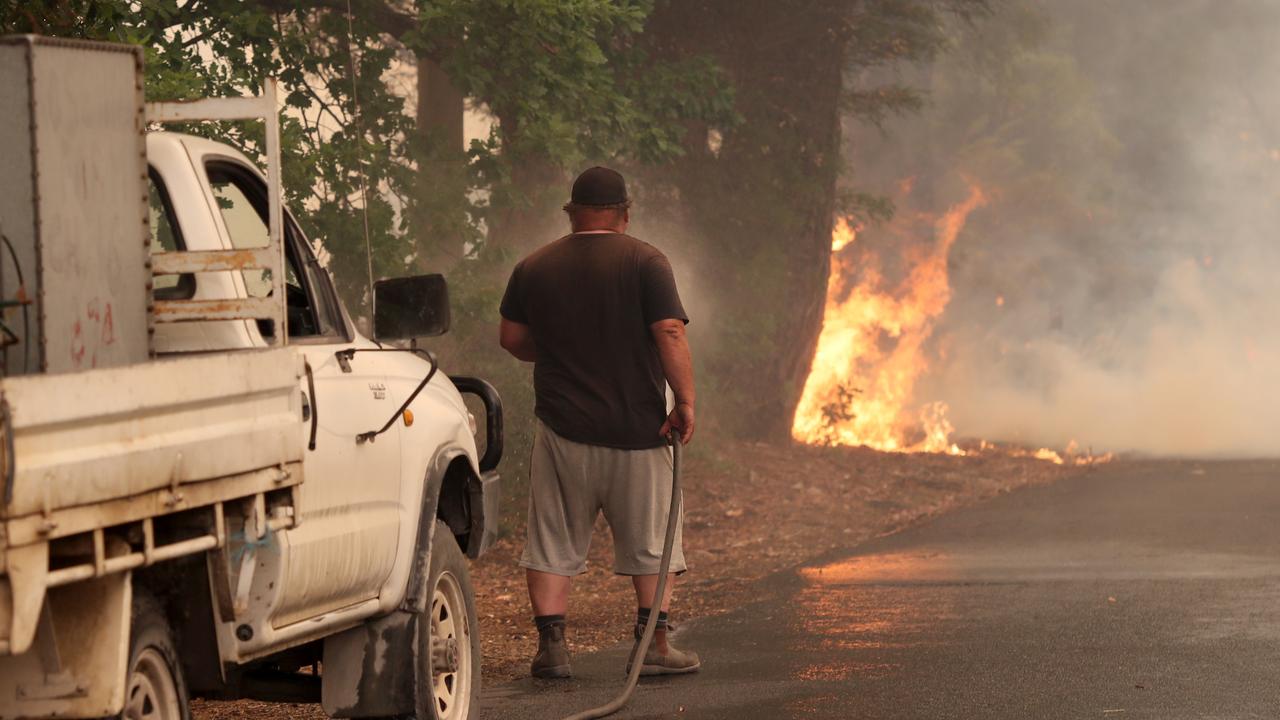South Australia’s historic COVID vaccine rollout begins with Premier, Spurrier first to receive COVID jabs
SA’s COVID-19 vaccination program has officially launched, with the Premier and Prof Nicola Spurrier receiving the first jabs as they reiterated the importance of a widely immune population.
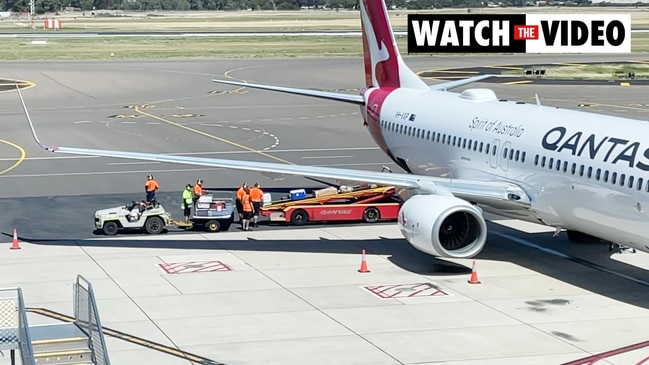
Coronavirus
Don't miss out on the headlines from Coronavirus. Followed categories will be added to My News.
After a gruelling 387 days since South Australia’s first COVID-19 case, the state’s landmark coronavirus vaccine operation launched on Monday.
Premier Steven Marshall had SA’s first Pfizer jab before Police Commissioner Grant Stevens and chief public health officer Nicola Spurrier were vaccinated.
The vaccine was administered to 147 people, including the state’s medi-hotel workers, at the Royal Adelaide Hospital and Flinders Medical Centre.
At least 12,000 “high-risk” people will be vaccinated over the next three weeks, including frontline workers in quarantine facilities, healthcare and nursing homes, as well as aged-care residents.
Authorities insist the jab is safe, free and voluntary.
Having urged as many people to get vaccinated as possible, Mr Marshall, wearing a short-sleeve polo, received the state’s first jab at 8.21am.
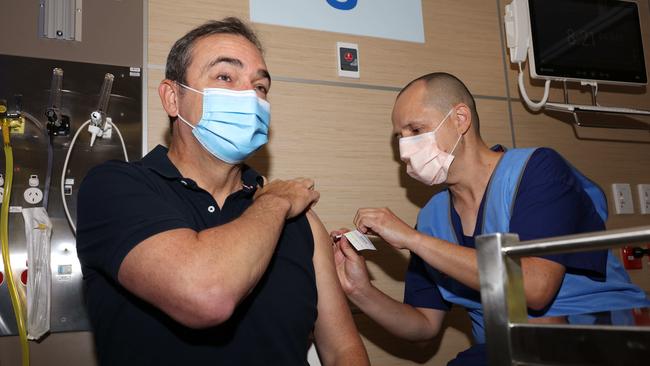
“Very good,” he said in front of a bank of cameras as the needle was removed.
“It’s really important to get it. The more people that are vaccinated, the safer we’re going to be.”
Sitting next to him, Prof Spurrier had a “big smile” behind her mask as she was jabbed.
“Easy,” she said as her nurse told her what a “good patient” she was.
A few minutes later, Mr Stevens had his vaccine shot before quipping: “There’s a slight prick but that’s part of life, isn’t it.”
Health Minister Stephen Wade was also vaccinated.
The quartet, who later gave “V” finger signs, said they went first to instil public confidence in the vaccine program.
Prof Spurrier said it had been a “gruelling 12 months for so many of us” but the vaccine was the “next step” to stop the pandemic and its effects.
She said easing restrictions and resuming international travel would only occur with a widely immune population.
“We want to lift the restrictions, we want to go back to a society where we’re not having to be worried about the threat of the pandemic,” she said.
The first medi-hotel worker to get the jab was nurse Annabel Thomas, 30.
Also receiving the vaccine was security guard Anthony Ward, 21, and police officer Amanda Kuchel.
At FMC, nurses Joan Greaves and Kim Corbin were the first to get the jab.
“I think it’s a very important thing to do,” said Ms Greaves.
Another 1726 “high risk” workers will be jabbed this week. The RAH will take 3000 doses, including 100 “high risk pathway” workers on Monday, while Flinders Medical Centre will vaccinate 1000 people this week.
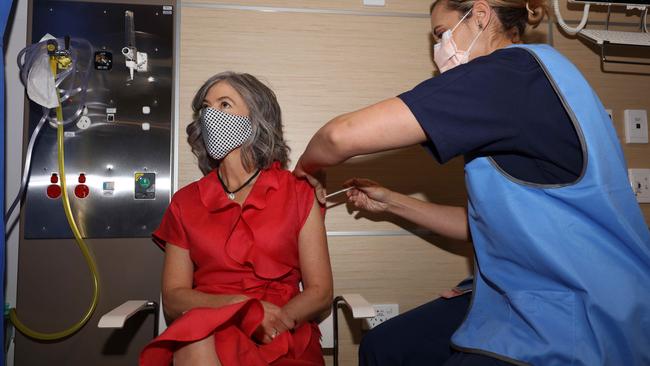
Earlier, Prof Spurrier said the easing of restrictions and resuming international travel would only occur with a widely immune population.
“People have asked me over the last couple of weeks, what will this mean, in terms of restrictions? Can we start dancing again, Nicola, you know, these are important questions,” she said.
“We want to lift the restrictions, we want to go back to a society where we’re not having to be worried about the threat of the pandemic.
“It would be very difficult to open our international borders, unless we have a highly vaccinated community here in South Australia, and indeed, across Australia.”
She said no steps had been skipped developing the vaccines in a “really robust and rigorous scientific community”.
She was confident to have the jab and felt “very privileged” to be amongst the first to be vaccinated.
“But I can’t expect other South Australians to have the vaccine unless I’ve had it. And so I’m encouraging through my action today, for you when it’s your turn, to put your arm out and get that vaccine,” she said.
“So please join me on this historic day of really celebrating how the scientific community around the world and in Australia have come together and have gone on and got this vaccine sorted out, developed, produced, and here in at the Royal Adelaide Hospital in less than a year.”
Prof Spurrier hailed the “wonderful day”. “I am so excited that we’ve got this vaccine now in South Australia,” she said.
“It’s been a gruelling 12 months for so many of us. We’ve had people who’ve lost their jobs. We’ve had businesses impacted and border closures. It has had such a profound effect on so many South Australians.
“But with this vaccine, it is really the next step in being able to prevent this pandemic and the effects that it’s had on our society.
“And I know many people will ask is it safe and ask those questions and it is very important to ask those questions. But I am very confident of the safety of this vaccine.”
Asked about the anti-vax protests, Prof Spurrier said the majority of people had listened to health experts, including from her team, and world leading scientists about the vaccines’ safety.
“I feel very confident that South Australians will get the right information, will do their homework and understand that this is safe,” she said.
“We’ve had vaccines for many, many years for other diseases. Parents take their kids to get vaccinated every day around South Australia. We have managed to get on top of really nasty diseases such as measles and polio.
We don’t see these anymore. In fact, my mother was telling me she was one of the doctors involved with vaccinating kids in New Zealand for measles many years ago.
“So we’ve managed to get on top of those diseases, we don’t see them anymore because of vaccination. And it is the one best thing to prevent transmission of infectious diseases. So why wouldn’t we do it with COVID?”
Mr Stevens, who authorises restriction changes as state COVID co-ordinator, said officials were monitoring the rollout with any decisions about easing restrictions.
“People are entitled to their views. We respect that. But as it’s been said, it is safe, it is free. And it’s voluntary,” he said.
“There’s no requirement for people that have this. I’m here today to demonstrate that I have confidence in it, and that it’s an important step in South Australia and encourage people to get out.”
Mr Marshall also implored people to get the vaccination as he celebrated the “historic day”. He said the group were getting their jabs in a show of force to show the community it was safe.
“Only, I suppose less than a year ago we started really ramping up our response to the global pandemic and here we are with the vaccine rollout,” he said outside the RAH.
“Many people were telling us this vaccine rollout would take many years to even begin. And here we are less than a year from the major emergency declaration in South Australia.
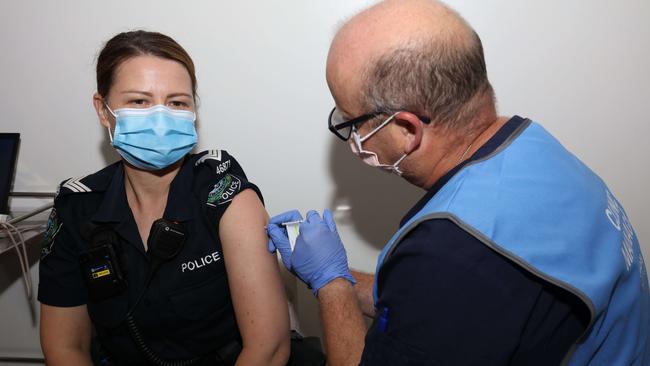
“Now we’re starting to really enjoy an incredible quality of life that many other parts of the world can’t even envisage at the moment. It’s important that we continue with that.”
He said some people might be a “bit anxious about vaccinations”.
“Some people might even say it’s not for me, I’m young, I don’t need it,” he said.
“Look, the simple facts of the matter is that the vaccination is safe. And it’s really important to get it. The more people that are vaccinated, the safer that we’re going to be in South Australia. It’s very important.
“It’s a very important step to make sure that you can keep yourself protected, but more importantly, your family, your friends, your work colleagues, the greater community in South Australia.
“Let’s make sure that we can have a similar level of cooperation with the vaccination program so that we can continue to enjoy that wonderful freedom that we have in South Australia, I think the envy of the world.”
The highly-anticipated batch of 4000 Pfizer doses landed at Adelaide Airport about 3pm on Sunday, before being taken to the Royal Adelaide Hospital and Flinders Medical Centre in specifically designed “thermal shippers” at temperatures below -70C.
The vaccines, delivered by DHL, were due to arrive at the Royal Adelaide Hospital about 4pm.
However, after a complex handover operation, the delivery didn’t arrive at the hospital until just before 5.30pm.
After leaving the boxes, crews had just five minutes to safely store the vaccines in Ultra-Low Temperature Freezers, otherwise they would be damaged.
Mr Wade said the RAH hub would focus on vaccinating medi-hotel staff first before moving on to frontline healthcare workers.
“We have been eagerly anticipating this day since the vaccine first received approval as safe and effective to administer in Australia,” Mr Wade said.
“We are about to embark on our state’s biggest ever peacetime logistical operation.”
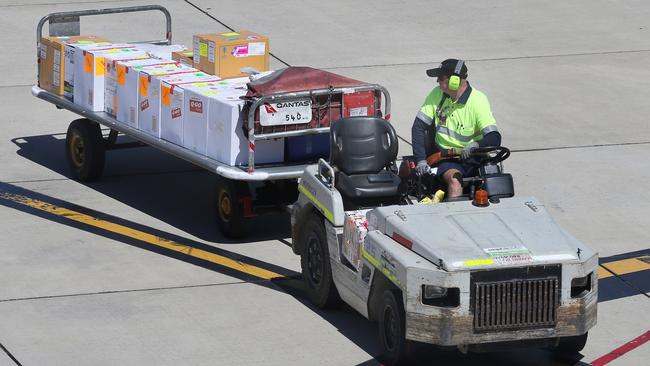
Mr Wade expected “road bumps” in the program, but was confident in the state’s “nimble, evidence based approach”.
SA will receive weekly deliveries of COVID vaccines, with plans to inoculate 12,000 people in the first three weeks.
“For the first few weeks, it will primarily be SA Health and the Commonwealth going out to (health workers) and providing them with an opportunity to be vaccinated,” Mr Wade said.
“As we move further into the program, both the Commonwealth and the state will have a massive communication effort to make sure people are aware when they are eligible to get vaccinated and how they can vaccinated.
“In that wave, most people will be asked to make contact with one of the immunisation providers …”
As the operation expands over the coming months, doses will become available at GP clinics and pharmacies for the broader community.
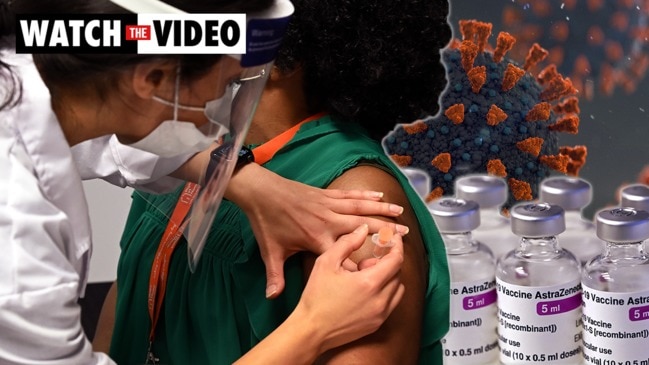
“Through a staged approach to the vaccination rollout, we can make sure those most vulnerable to the effects of COVID-19 and those who have the highest risk of being exposed to or spreading, the virus are vaccinated first,” Mr Wade said.
Acting chief medical officer Michael Cusack assured South Australians the vaccine was safe.
“There’s 200 million doses now that have been delivered across the globe and that number is increasing very quickly,” he said.
“Of that (number), we have seen very little in the way of adverse effects and serious allergy numbers are very, very low.”
Sunday’s delivery came as SA recorded two new COVID cases – both returned travellers in hotel quarantine.
One case was a child who has returned from overseas and was taken to the new Tom’s Court hotel.
The other was woman in her 30s who also returned from overseas and has been in a medi-hotel since her arrival. This case is considered an old infection but has been added to our numbers as it has not previously been counted overseas.
Professor Spurrier has repeatedly assured South Australians: “The vaccine is safe”.
“Vaccination is the best form of prevention, and in turn I’d love it if every South Australian gets the jab to protect themselves from this serious disease,” she said.
While not mandatory, the State Government has ambitious plans to offer every SA resident, aged 16 and over, a jab by Christmas.




